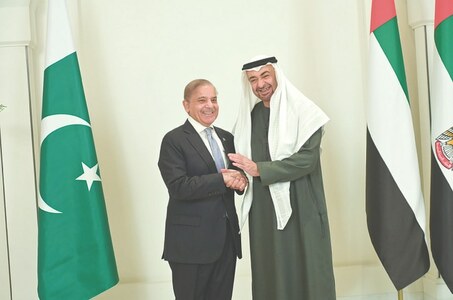TEHRAN, April 4: Iran insisted on Sunday that it was not hiding any of its nuclear facilities from UN inspectors, and that its resumption of work on a key part of the nuclear fuel cycle was not a violation of its commitment to suspend uranium enrichment activities.
"There is no nuclear site that the (International Atomic Energy) Agency is not aware of and that we have hidden from IAEA inspectors," foreign ministry spokesman Hamid Reza Asefi told reporters ahead of a key visit by the UN watchdog's director, Mohammed ElBaradei.
"We have a transparent and constructive cooperation with the agency, and this will continue," the spokesman said, describing ElBaradei's visit on Tuesday - his third trip to Iran since February 2003 - as "important". "We are committed to our engagements, and up to now have not violated any of them," he said.
Iran is under mounting international pressure over its nuclear programme, and angrily denies US charges that its civil atomic energy programme is a cover for ambitions to secretly develop nuclear weapons.
In March it was condemned by the IAEA for continuing to hide sensitive nuclear activities, including designs for sophisticated P2 centrifuges for making enriched uranium which could be weapons-grade.
In addition, Britain, France and Germany have condemned Iran's decision to resume work on a key part of the nuclear fuel cycle. In a deal with the IAEA brokered last year by the European Union's big three, Tehran agreed to suspend uranium enrichment and related activities while UN inspectors delved into its programme.
But Asefi claimed the resumption of work at a uranium conversion facility near the central city of Isfahan, announced here last week, was not a violation of the deal.
"The resumption of activities at Isfahan does not violate any of our commitments. It is for the production of UF4 in an experimental fashion, which is nothing to do with our commitment to voluntarily suspend uranium enrichment," he told a weekly news conference.
UF4, or, uranium tetrafluoride, can serve as a base for the production of uranium hexafluoride (UF6) - a compound then used in enrichment. The problem appears to centre on how each side defines the suspension, with Iran apparently working to a more narrow definition of what constitutes a part of the enrichment process.
The Europeans had hoped Iran would entirely halt its work on the highly sensitive nuclear fuel cycle - which is allowed under the terms of the nuclear NPT but once mastered can easily be diverted towards military ends. -AFP













































Dear visitor, the comments section is undergoing an overhaul and will return soon.